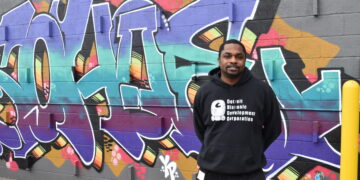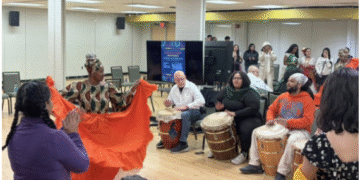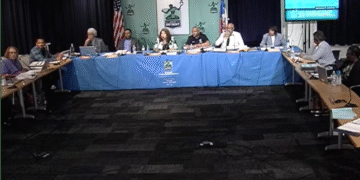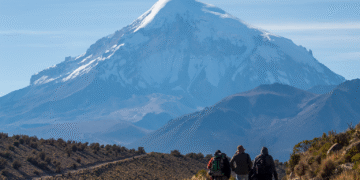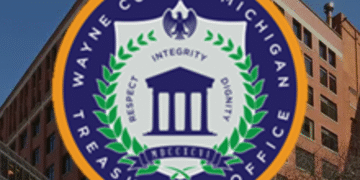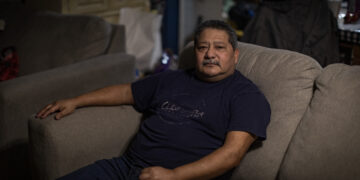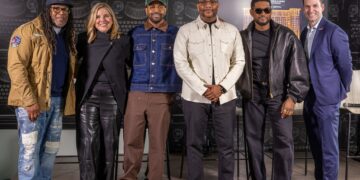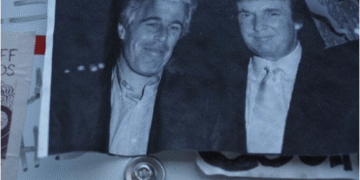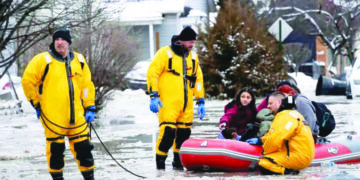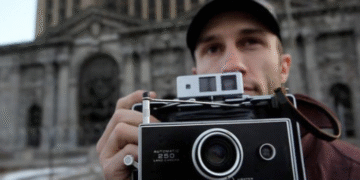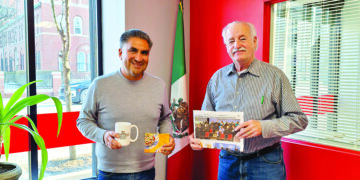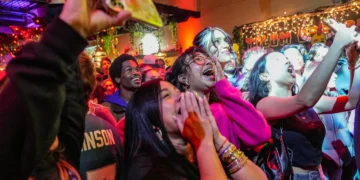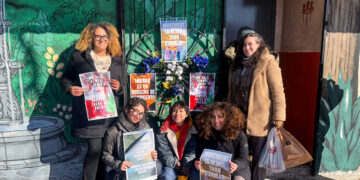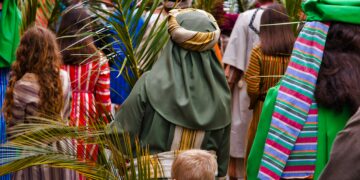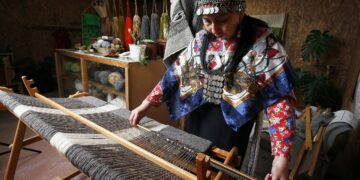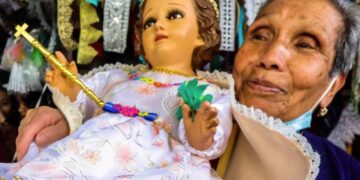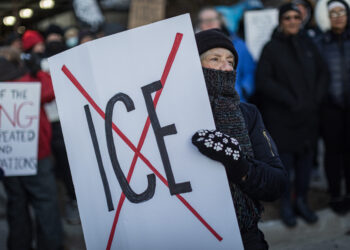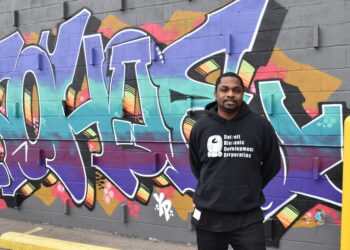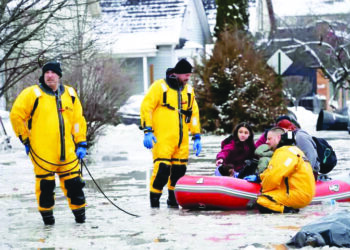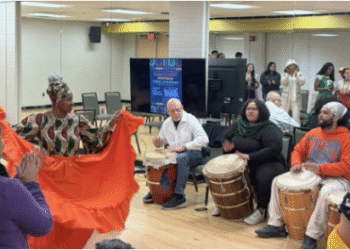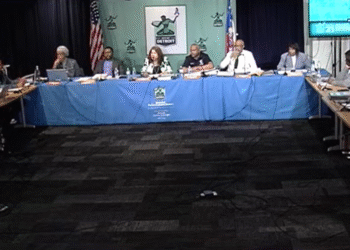This past Friday night, December 6, the VOCES: Southwest Detroit Oral History Project team introduced their project to the general community of Southwest Detroit. Entitled ”Let Our Story Begin” they shared their work in documenting our community’s history in Detroit. Approximately 80 people attended. In attendance were elders, young activists, educational, cultural and community leaders, among others.
As soon as you entered the Mexicantown Community Development Corporation’s site for the activity, we were welcomed into a brightly colored environment which was orchestrated by event planners Angela Gallegos and Angela Perez-Harris. Colorful banners highlighted a number of past and present leaders, such as businessman Frank Venegas, DHDC Executive Director Angie Reyes, musician Ismael Duran and historian/community activist Dr. Lucile Gajec. Additional banners featured historic photos from as far back as the 1930s of the original Corktown neighborhood community. Alina Morr’s Urban Tropical Trio provided the musical background.
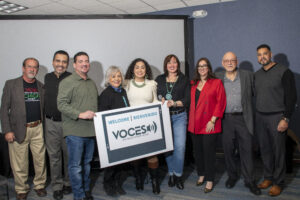
Once the program started, attendees heard from VOCES member and director of the acclaimed film, Un Dia Normal, Maurizio Dominquez. Maurizio introduced a short documentary video clip of the work done to date by members of the committee. The film clip included segments with educators and musicians Benny Cruz and Panchito Lozano recorded well over 10 years ago as well as one done recently with Humberto Oriel, one of the founders of our city’s Cinco de Mayo Parade. It also included a segment from a February 2024 Black History Month presentation by Mario Grillo at Wayne State University about the formation and legacy of Afro Cuban Latin jazz and salsa that was propelled forward by his father the great Machito and his uncle Mario Bauzá. As far as we know, this is probably the last time Mario Grillo was recorded speaking publicly before his death this past summer.
A panel presentation followed. Maria Elena Rodriguez, long time civic and media activist and author of Detroit’s Mexicantown and Len Radjewski, film maker and one of the keepers of his family’s website, Michoacan to Michigan www.thefragafamily.com presented on their efforts to document our community’s history: Maria in painting a broad brush of community history and events and Len of his extended family’s story, capturing their history starting with the immigration of their grandparents’ journey from Mexico in 1918 through their settlement first in the Saginaw/Thumb area of Michigan then later Detroit. The Fraga family’s efforts led to a documentary film, Michoacan to Michigan, which debuted at the Detroit Institute of Arts’ Film Theatre Sunday October 19th, 2019. Their presentations were followed by lively audience interaction and discussion. In attendance were a significant number of elders, who as veterans of the civil rights, educational and cultural movements of past decades, have contributed to our community’s history, vibrancy and longevity.
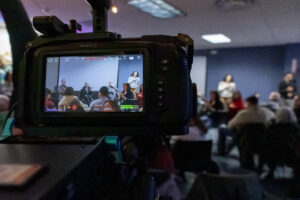
At the end of the formal program a general call to action was made for audience members and others to promote the project and provide stories and well as photos that could be added to this collective effort. Noting that our community has been in the Detroit area well over 100 years much more needs to be done to truly tell that story.
After the official program was over most attendees stuck around and continued lively discussions, many noting how happy they were to hear that a serious effort is being organized to document our El Barrio’s history and of their pride knowing that our community has birthed and nurtured many local and national leaders.
The VOCES team was formed about a year and a half back and is comprised of the following individuals: Tanya Saldivar-Ali who along with her husband Luis Ali are co-owners of AGI Construction, Martina Guzman, award-winning journalist, Mauricio Dominguez, filmmaker, Irma Andrade–Guzman, archival specialist and freelance writer, Aaron Barndollar, filmmaker and musician and yours truly. In a relatively short period of time our small committee was able to move our ideas from a concept to the beginnings of what we hope will be a successful and significant documentary and potential exhibit. This phase of our work enjoyed support from a Kresge Foundation pilot planning grant.
The VOCES team stands on the shoulders of others. This work of documenting our community is not new. We acknowledge the past efforts of a number of individuals and organizations who have diligently written about and/or produced short videos and/or videotaped events over the past few decades. Among those who have done this work are Dr. Lucile Gajec, the Ybarra and Fraga families, Maria Elena Rodriguez, Casa de Unidad, Elena Herrada, Roberto Munoz, and Mary Luevanos, among others.
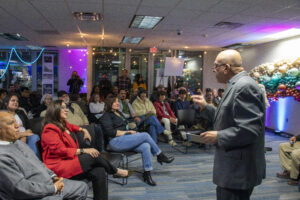
Our immediate source of inspiration was the efforts by musician Cesar Pena who interviewed and videotaped at least 30 area musicians over a few years in his quest to produce a documentary about Southwest Detroit and Delray’s rich musical tradition. Unfortunately, he passed before he could finalize the project. Also, not too far back in the past, from 2010 to 2012, current VOCES members Aaron Barndollar and Ozzie Rivera were part of a team that conducted and videotaped a number of interviews with educators and musicians that now can be found on VOCES’ YouTube channel. Other members included musician Eddie Caraballo and cultural activist Consuela Lopez. The documentary short shown at the December 6 event included clips from a number of those interviews conducted between 2010-2012.
As the VOCES team shared at the launch last Friday , this is just the beginning of our efforts. The possibilities are exciting as it is evident others will be contributing their insights, memories and energies. In the meantime, you don’t have to wait for a “finished” product. We are regularly adding video clips to our YouTube channel called VOCES: Southwest Detroit History. It can be found at https://www.youtube.com/@SWDetroitHistory
For more information on our ongoing efforts and to possibly contribute, bit.ly
Please share community members who you think should share their history for the Voces Oral History Project.
“Que comience nuestra historia”: Proyecto de historia oral de VOCES en el suroeste de Detroit.
En la noche del 6 de diciembre, el equipo del Proyecto de historia oral del suroeste de Detroit de VOCES presentó su proyecto a la comunidad en general del suroeste de Detroit. Con el título “Que comience nuestra historia”, compartiendo la documentación de la historia de la comunidad en Detroit. Asistieron aproximadamente 80 personas, entre ellas ancianos, jóvenes activistas, líderes educativos, culturales y comunitarios, entre otros.
Tan pronto como ingresamos al sitio de la Corporación de Desarrollo Comunitario de Mexicantown para la actividad, fuimos recibidos en un ambiente colorido, orquestado por las organizadoras de eventos Ángela Gallegos y Ángela Pérez-Harris. Las coloridas pancartas, destacaron a antiguos y actuales líderes, como el empresario Frank Venegas, la directora ejecutiva de DHDC Angie Reyes, el músico Ismael Duran y la historiadora y activista comunitaria Dra. Lucile Gajec. Las pancartas adicionales tenían fotos históricas de la comunidad del vecindario original de Corktown, que datan de la década de 1930. El Urban Tropical Trio de Alina Morr proporcionó la música.

Una vez que comenzó el programa, los asistentes escucharon a un miembro de VOCES, director de la aclamada película Un día normal, Maurizio Domínguez, quien presentó un breve video documental del trabajo realizado hasta la fecha por los miembros del comité. El clip de la película incluía segmentos con los educadores y músicos Benny Cruz y Panchito Lozano grabados hace más de 10 años, así como uno realizado recientemente con Humberto Oriel, uno de los fundadores del Desfile del Cinco de Mayo de nuestra ciudad. También incluyó un segmento de una presentación del Mes de la Historia Negra de febrero de 2024 a cargo de Mario Grillo en la Universidad de Wayne State sobre la formación y el legado del jazz latino y la salsa afrocubana que fueron impulsados por su padre, el gran Machito, y su tío Mario Bauzá. Hasta donde sabemos, esta es probablemente la última vez que Mario Grillo fue grabado hablando en público antes de que falleciera, el verano pasado.
A continuación, se presentó un panel con María Elena Rodríguez, con gran trayectoria como activista cívica y de comunicación social y autora de Detroit’s Mexicantown, y Len Radjewski, cineasta y una de las administradoras del sitio web de su familia, Michoacan to Michigan (www.thefragafamily.com), hablaron sobre sus esfuerzos por documentar la historia de la comunidad: María pintó una amplia pincelada de historia y los eventos de la comunidad y Len, de la historia de su familia extendida, quien comenzó a contar desde la migración de sus abuelos de México en 1918, hasta su asentamiento en el área de Saginaw/Thumb de Michigan y luego en Detroit. Los esfuerzos de la familia Fraga dieron lugar a un documental, Michoacan to Michigan, que debutó en el Cine del Instituto de Artes de Detroit el domingo 19 de octubre de 2019. Sus presentaciones fueron seguidas por una animada interacción y discusión con la audiencia. Asistieron un número significativo de ancianos, quienes, como veteranos de los movimientos de derechos civiles, educativos y culturales de las últimas décadas, han contribuido a la historia, vitalidad y longevidad de nuestra comunidad.

Al final del programa oficial, se hizo un llamado general a la acción para que los miembros de la audiencia y otras personas promovieran el proyecto y compartieran historias y fotos que pudieran agregarse a este esfuerzo colectivo. Teniendo en cuenta que nuestra comunidad latina ha estado en el área de Detroit durante más de 100 años, se necesita hacer mucho más para contar realmente esta historia.
Después de que terminó el programa oficial, la mayoría de los asistentes se quedaron y continuaron con debates animados; muchos comentaron lo felices que estaban de escuchar que se está organizando un esfuerzo serio para documentar la historia de nuestro barrio y de su orgullo al saber que nuestra comunidad ha dado a luz y nutrido a muchos líderes locales y nacionales.
El equipo de VOCES se formó hace aproximadamente un año y medio y está compuesto por las siguientes personas: Tanya Saldívar-Ali, quien junto con su esposo Luis Ali son copropietarios de AGI Construction, Martina Guzmán, periodista galardonada, Mauricio Domínguez, cineasta, Irma Andrade-Guzmán, especialista en archivos y escritora independiente, Aaron Barndollar, cineasta y músico y un servidor. En un período de tiempo relativamente corto, nuestro pequeño comité pudo convertir nuestra idea de un concepto, en la inauguración de lo que se espera que sea un documental exitoso y significativo y una posible exhibición. Esta fase de nuestro trabajo contó con el apoyo de una subvención de planificación piloto de la Fundación Kresge.
El equipo de VOCES se apoya en el esfuerzo de otros, pues la labor de documentar a nuestra comunidad no es nueva. Reconocemos los esfuerzos de una serie de personas y organizaciones que han escrito diligentemente sobre y/o producido videos cortos y/o grabado eventos en video durante las últimas décadas. Entre quienes han realizado este trabajo se encuentran la Dra. Lucile Gajec, las familias Ybarra y Fraga, María Elena Rodríguez, Casa de Unidad, Elena Herrada, Roberto Muñoz y Mary Luevanos, entre otros.

Nuestra fuente de inspiración inmediata fueron los esfuerzos del músico César Peña, quien entrevistó y grabó en video a por lo menos 30 músicos de la zona durante varios años, en su búsqueda por producir un documental sobre el suroeste de Detroit y la rica tradición musical de Delray Florida. Desafortunadamente, falleció antes de poder finalizar el proyecto. También, no hace mucho, de 2010 a 2012, los miembros actuales de VOCES Aaron Barndollar y Ozzie Rivera formaron parte de un equipo que realizó y grabó en video una serie de entrevistas con educadores y músicos que ahora se pueden encontrar en el canal de YouTube de VOCES. Otros miembros incluyeron al músico Eddie Caraballo y a la activista cultural Consuela López. El cortometraje documental que se mostró en el evento del 6 de diciembre incluyó clips de varias de esas entrevistas realizadas entre 2010 y 2012.
Como compartió el equipo de VOCES en el lanzamiento el viernes pasado, este es solo el comienzo de nuestros esfuerzos. Las posibilidades son emocionantes, ya que es evidente que otros contribuirán con sus ideas, recuerdos y energía. Mientras tanto, no tiene que esperar un producto “terminado”. Regularmente agregamos videoclips a nuestro canal de YouTube llamado VOCES: Southwest Detroit History. Puede encontrarlo en https://www.youtube.com/@SWDetroitHistory
Para mas información: bit.ly


